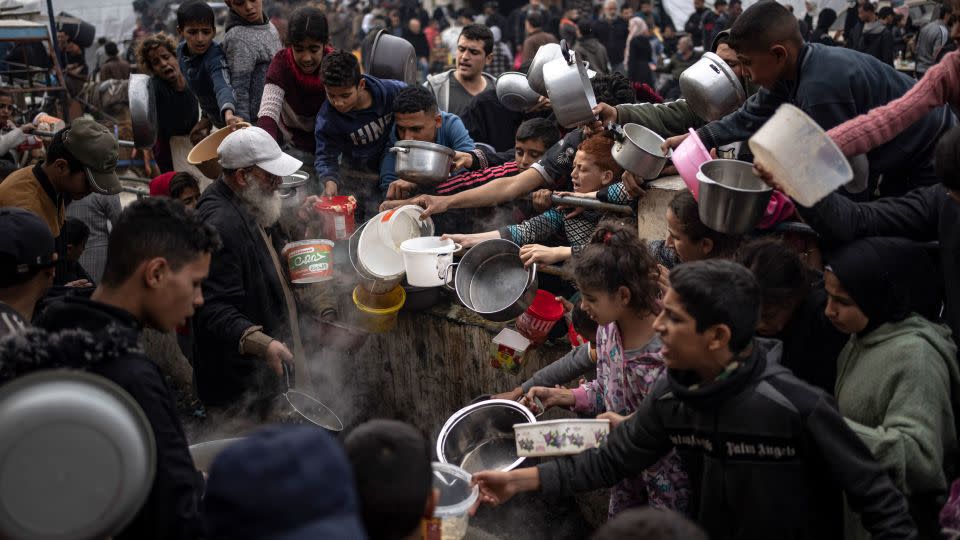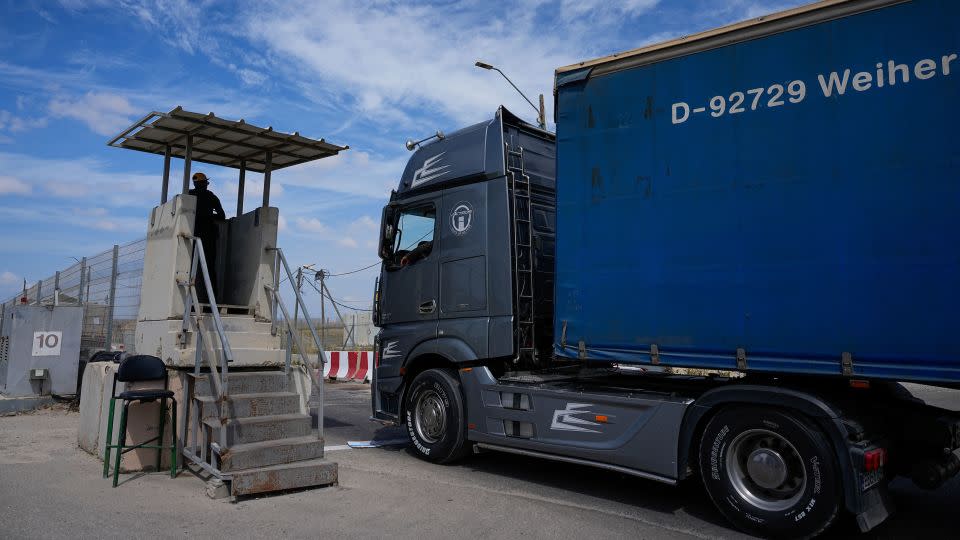Opinion: The near-impossible task of providing food aid in Gaza
Editor’s Note: Kerri Kennedy is the associate general secretary for international programs at the American Friends Service Committee. The views expressed in this commentary are her own. Read more opinions at CNN.
Earlier this month, our team of humanitarian workers had to stop distributing aid in Gaza. Like most of the population there, our aid workers urgently needed to find new places for themselves and their families to shelter.

In recent weeks, Israel airdropped leaflets on eastern Rafah, instructing hundreds of thousands of Palestinians to move to areas that have already been destroyed. Israeli airstrikes were intensifying, and the ground invasion was about to begin.
Almost all humanitarian aid providers were operating out of Rafah, including my colleagues from the American Friends Service Committee (AFSC). Our staff in Gaza had been serving hot meals from open-air kitchens and hosting recreational activities for children and teens.
Since October, the team in Gaza has provided lifesaving humanitarian aid to more than half a million people. They continued to provide this aid even as they faced unbearable personal trauma. Their homes had been bombed. They had been forced to relocate over and over in search of a safety that does not exist. Dozens of their family members had been killed by air strikes.
Our office in Gaza City, located within a protected and deconflicted building, was bombed on October 9 — we don’t know if it is still standing. In Rafah, our staff were living in a compound with dozens of other families while continuing to organize the complex logistics of providing humanitarian aid. Now they are again seeking shelter.
In recent days, hundreds of thousands of people have fled Rafah, fearing for their lives. Prior to this latest Israeli operation, there had been 1.4 million Palestinians in Rafah, most of whom had already been forcibly displaced from elsewhere. This included over 600,000 children, nearly all of whom were sick, severely traumatized, injured or malnourished. More children have been killed in Gaza over the last seven months than in all global conflicts combined between 2019 and 2022.
Meanwhile, the Israeli military has intermittently blocked aid from entering at the Kerem Shalom crossing. Israel has seized and closed the Rafah crossing since launching their military invasion of the southern border. Rubble and active hostilities are blocking passage of both trucks and people. Both crossings have been completely destroyed on the Palestinian side by the Israeli army. Israeli settlers are attacking aid trucks and destroying food stores.

On May 1, an AFSC truck loaded with 960 bags of flour was attacked by Israeli settlers on its way from Amman to Gaza, an attack detailed in a UN report. Our aid trucks in Egypt are among hundreds that have not been allowed to enter.
Egypt has also been reluctant to open its border through Kerem Shalom after Israel seized the Gaza side of the crossing. But on Friday the Biden administration announced that Egypt had agreed to temporarily open the border to allow aid through. This is a step in the right direction.
Israel has a legal obligation under international law to ensure the delivery of aid to meet humanitarian needs of Gazans. Instead, it is depriving the entire population there of access to food, water, medical supplies and other necessities of life.
Closing the Rafah crossing stops life-saving aid from reaching people who desperately need it. It also stops the delivery of the fuel needed for humanitarian operations. We are hearing that existing fuel stocks will be depleted within days. Bakeries, water treatment and desalination plants and remaining sewage pumping stations are among the many facilities that will be affected.
AFSC has been supporting humanitarian and justice efforts in Gaza since 1948. The United Nations asked us to support refugees who were forcibly displaced from their homes to Gaza, and we set up refugee camps and provided food aid.
I first visited Gaza over a decade ago in my role overseeing the peace and humanitarian work that AFSC does around the world. Our teams operate in many conflict zones — Myanmar and Sudan among them. Despite 25 years of experience leading operations in complex circumstances, I was struck by the extreme sequestration of Gaza.
It took months for Israel to approve my visit. I traveled to the Erez crossing on the northern section of Gaza and went through several Israeli checkpoints and screenings and then a long metal tunnel. As a humanitarian worker with a US passport, I was able to cross the border. But for many years, few Palestinians were able to leave without permission from the Israeli government. Now it is almost impossible.

The Gaza Strip is a small area, about the size of Detroit. It has been under an Israeli blockade for 17 years that has limited movement and trade, and controlled electricity and access to water. Today, Gaza is completely inaccessible by standard humanitarian procedures. Seventy percent of Gazans face a catastrophic risk of starvation.
The Palestinians who were told by the Israeli government to evacuate to Rafah are stuck. Now they’ve been told to move once again but have nowhere to go: Most of the buildings in Gaza have been damaged or destroyed. Reports estimate that it will take 14 years just to clear the rubble.
There has been broad global agreement that an attack on Rafah would cause an alarming increase in civilian deaths and exacerbate the unprecedented humanitarian crisis. Many leaders around the world, including President Joe Biden, have spoken out against an invasion of Rafah, treating it as a red line. In the US Congress meanwhile, 57 lawmakers signed a letter opposing an invasion and calling on the US to withhold the transfer of any offensive weapons to Israel if it moves forward.
Biden paused a shipment of 2,000 pound bombs and other heavy artillery to Israel. But that’s not nearly enough — especially not while he moves forward as planned with another billion-dollar arms sale to the Israeli government. This new arms deal includes millions for tank ammunition and mortar rounds. But for the people of Gaza, there is no consolation in being killed by a US-made bullet rather than a US-made bomb.
In Gaza, children are dying every day. Thousands of families are on the move in a desperate search for safe quarters. We must preserve international humanitarian law and prevent further death and starvation. An attack on the last nominally safe space in Gaza violates all rules of war.
President Biden must surely know that this is a line that cannot be crossed. He has the power to insist that Israel adhere to international humanitarian and human rights law, allow unimpeded humanitarian access, and agree to a cease-fire.
Without US military support, Israel will likely need to change course. For the integrity of our long-established humanitarian conventions — and in the name of our collective humanity — we must stop the killing in Gaza.
For more CNN news and newsletters create an account at CNN.com


